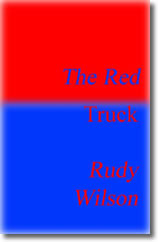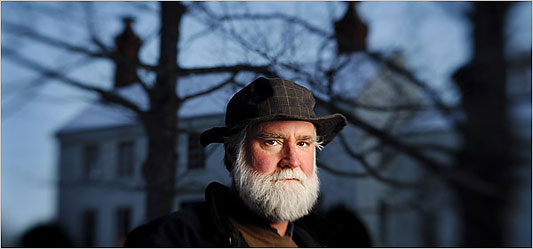Blake Butler
http://www.gillesdeleuzecommittedsuicideandsowilldrphil.com/
Blake Butler lives in Atlanta. His third book, There Is No Year, is forthcoming April 2011 from Harper Perennial.
http://www.gillesdeleuzecommittedsuicideandsowilldrphil.com/
Blake Butler lives in Atlanta. His third book, There Is No Year, is forthcoming April 2011 from Harper Perennial.
How about next time instead of National Novel Writing Month it’s National Single Sentence Writing Month? Or National Staring Month? NaSiSeWriMo? NaEaADiMoAnStoEaAllOuLiMo?
Cool piece on writing processes of a range of writers, including Kazuo Ishiguro, Michael Ondaatje, Richard Powers, Margaret Atwood, at Wall Street Journal [via Rozalia Jovanovic]
Most days, Nicholson Baker rises at 4 a.m. to write at his home in South Berwick, Maine. Leaving the lights off, he sets his laptop screen to black and the text to gray, so that the darkness is uninterrupted. After a couple of hours of writing in what he calls a dreamlike state, he goes back to bed, then rises at 8:30 to edit his work.
Do you still try to write or find your brain still stuck on writing during holidays? Have you ever sent out a submission on a holiday? Does food (or family) eliminate your drive, or the reverse?
This is kind of amazing: some kid is suing World of Warcraft, partially, he claims, because it has contributed to his sense of alienation, and he has subpoenaed one of the dudes from Depeche Mode, “since he himself has been known to be sad, lonely, and alienated, as can be seen in the songs he writes.” He’s also called on Wynona Ryder because of her sometime talking about how she loved The Catcher in the Rye, and “how alienation in the book can tie to alienation in real live [sic] / video games such as World of Warcraft.” Makes sense to me…
 Very excited last night by an email from Peter Markus, who mentioned that the long-difficult-to-drum-up novel The Red Truck by Rudy Wilson has just been reprinted by Ravenna Press, along with another new book by Mr. Wilson. I seriously almost paid a heftier tag a week or two ago when I was about to buy the original version on Amazon used, but now the always excellent Ravenna has solved that problem.
Very excited last night by an email from Peter Markus, who mentioned that the long-difficult-to-drum-up novel The Red Truck by Rudy Wilson has just been reprinted by Ravenna Press, along with another new book by Mr. Wilson. I seriously almost paid a heftier tag a week or two ago when I was about to buy the original version on Amazon used, but now the always excellent Ravenna has solved that problem.
If you haven’t read Rudy Wilson before, via this novel or in issues of Unsaid or elsewhere, here’s Peter on why this means you should be excited too:
The Red Truck is one of those late-80s Knopf books edited by Lish that I found remaindered one day in some TV appliance-warehouse-turned-bookshop that is now a place that sells tires. I took it home and immediately could feel the sensation of something new running through my hands. I think it’s a brilliant book, a one of a kind book, a book that wouldn’t have been made into a book had it not found its way into Gordon’s hands. I think the story goes behind it that Lish cut the manuscript in half (sort of what he did to Barry Hannah’s revved up Ray). I suspect what Lish did was find the core of Rudy’s Red Truck and cut away much of what a much younger Wilson thought was needed to hold the story together. For me it’s a novel that is pure hallucination and is the kind of book that I return to again and again in order to recapture that initial rush that language in its purest, most musical form can offer to us. Each time that I do Rudy’s sentences unglue me and then put me back together in new ways. I let my sister read The Red Truck, some years ago, and when she did she ended up having a major seizure. The effect that the book had on my sis is what we all want from our work: sentences that take hold of the brain and seize it up, unhinge us from the world around us, and make the body of us do some fucked-up sort of pogo to a music that Wilson’s song makes us hear inside our own heads. The Red Truck by Rudy Wilson is the realest of deals. You can get it now from Ravenna Press along with a brand new book of short fiction by Wilson called Sonja’s Blues. And while you’re loitering around at the Ravenna website, do yourself a third favor and nab Norman Lock’s The Long Rowing Unto Morning, an equally dreamy and necessary book. Thanks for listening.
You can pick up the book, also available in a package deal with Wilson’s Sonja’s Blue, now from Ravenna Press.
Now we just need all those other Knopf gems to get the same treatment…
(1) Excellent ode to the use of the telephone in film at I Heart Hotdogs [via notcoming]
(2) Excellent Félix Fénéon Novels in Three Lines feature this week at 52 Stories.
Nice interview with Kate Bernheimer at Conjunctus: “The Great Gatsby is as much a fairy tale as Coraline. Sometimes the fantastical resides in the syntax. Sometimes it resides in a closet.”

Last week I read Nicholson Baker’s new novel, The Anthologist, all in an evening sitting propped uncomfortably across the smaller of two sofas in my apartment. One thing about reading Nicholson Baker is in his exorbitantly minute and often startling descriptions (his first novel, The Mezzanine, is simply the thoughts of a guy during a ride up an escalator, which sounds boring but is incredible), you might think that it would then be easy to get caught up in the vibe, overthinking ideas and elements as you sit in the presence of a master doing the same. And yet, Baker is so good at catching all the spillage of thought you might have in listening to him speak, there is actually very little loosening of one’s own awareness while in the grip of even such an often everyday-aimed and frank voice as he wields. I hardly even recognized how uncomfortable I get usually while reading. It all went down, as have all of his books, leaving me hungry and excited, even in, again, a seemingly arbitrary subject matter: The Anthologist is about a guy, Paul Chowder, preparing to write the introduction to a poetry anthology. There is simply probably no one else alive who could pull this off, and Baker does, quite so.

This weekend on a trip to the New College of Florida, the most excellent Alexis Orgera and I got into a mini-discussion of our love for a good well-written mystery novel, one that asks more questions than it answers, and that doesn’t necessarily open and shut doors as much as it does fund eerie intricate descriptions and aura with a subtle pull that keeps you running along inside it. It seemed hard to think of a lot of books that fall into this category, though I recommended two I’ve loved in the past few years, Freidrich Dürrenmatt’s The Assignment (which I copped from a recommended list by the also mystery-making master Brian Evenson), and Jose Saramago’s The Double.
The Assignment is particularly interesting for its form, in that it is a set of chapters that are all one sentence, written to correspond with the movements of a piece of music that he composed the book to, I believe in a very short time, and yet the intricate form and wonderful sentences never falter from being a page turner. Saramago’s work as a whole, even when not based on premises so mysterious as the one in The Double (a man becomes obsessed with a minor character in a series of films who looks exactly like him, who he then begins to trace).
There is also Robbe-Grillet, and some of Paul Auster (I particularly love the mapmaking and patterns in the New York Trilogy and Oracle Night) and Dennis Cooper’s books have a distinguished mysterious pull. I am trying to think of more, here without my books.
What are some great mystery-style novels, pulp or literary, or ones that use that constantly updating confusion/terror/detective narrative drive to fuel their heart?